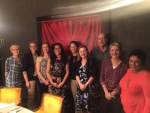Lijia Zhang's Blog, page 37
October 30, 2017
Fuchsia Dunlop
I was excited when I had heard that Fuchsia Dunlop, the famous writer and cook who specializes in Chinese cuisine, was also coming to Ubud Writers and Readers’ Festival. We had met for at least a decade ago, (Fuchsia, as a producer for the BBC, interviewed me before) but never really got to know her. I was very impressed by her memoir Shark’s Fin and Sichuan Pepper. This time, it was a real delight to spend time with her and hear her China stories and how she developed this amazing career, combining her interests in China and cooking.
Her latest book is Land of Fish and Rice – recipes from Jiangsu, my hometown, known as the culinary heart of China.
It is remarkable just to think that recipe book from a region in China can be sold like hot cakes. It is due to China’s rise, obviously, but also effort by people like Fuchsia. Well done, Fuchsia.


October 27, 2017
Women of Letters
Last night, I was among a bunch ‘handpicked’ writers for a special event entitled ‘Women of Letters’, which celebrates the lost art of letter writing in an age of instagram and twitter. Each writer read out a personal letter. Malay writer Bernice Chauly talked humorously about menopause while Australian Kate Holden, who is known for her best-selling memoir describing her experience as a sex worker, wrote a touching letter to her son. I wrote an ‘Ode to the BBC’, talking about how learning English and listening to the BBC changed my life, of course, in my usual entertaining fashion, which made people laugh. I did rather well – if I do say so myself, since so many people came up to me afterwards and told me how much they loved my story.
I am really fond of the form of letter writing. I had had a lot of practice: my ex-husband and I wrote thousands of letters to each other. Maybe I’ll a write a novel in a form of letter one day.


M
The best session at Ubud festival so far was the first one this morning by Canadian/Chinese Madeleine Thien about her new novel Do not Say We Have Nothing. It was shortlisted by Man Booker prize in 2016 and won several other rewards – deservingly. I was recommended by a few literary friends. I started to read while flying over to Bali. Already I am hooked and most impressed. It follows a ten-year-old girl Marie and her mother who takes in a young woman fleeing the aftermath of Tiananmen protests. It is ambitious and powerful and so beautifully written. I can’t recommend it higher.


October 26, 2017
Sharing a stage with jung Chang
This afternoon I had the great honor and pleasure to share a stage with Jung Chang, the famous author of the Wild Swans, talking about women in China, as part of the Ubud Writers and Readers Festival. She is a fabulous story teller and speaker. I am impressed. A large and enthusiastic audience – mostly thanks to her celebrity’s pulling power, I am sure.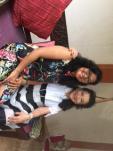



October 25, 2017
sexual harassment in China
October 23, 2017
October 8, 2017
My event in London
Delighted that my event The Hidden Stories at the south bank center in London, in conversation with brilliant writer Guo Xiaolu, moderated by fabulous translator Nicky Harman, went very well. Packed house, enthusiast audience. So grateful to my friends in UK who came to show their support. Thank you all.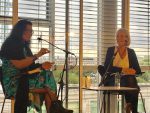
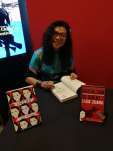
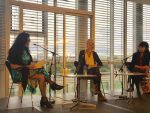


October 3, 2017
Lecturing at University of Nottingham
What a pretty place The University of Nottingham is! I gave a lecture here yesterday about the changing role of women in China and the setbacks brought by the market economy.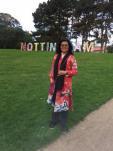




Lecturing at University of Nottingham
What a pretty place The University of Nottingham is! I gave a lecture here yesterday about the changing role of women in China and the setbacks brought by the market economy.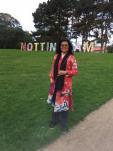




September 10, 2017
Key note speech
Last night, I gave a keynote speech to a delegation from Australia and New Zealand School of Governance, led by Allen Fels, an influential lawyer and public servant. I used my life story to show foreign visitors where china is coming from. I am pleased to say it went well!

